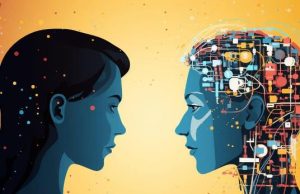The Impact of AI Companions on Human Social Skills
As artificial intelligence integrates more deeply into everyday life, the rise of AI companions—particularly in the form of AI girlfriends—has sparked a significant discussion about their impact on human social skills. This article explores the multifaceted effects of these digital relationships, providing a data-driven analysis of how they may enhance or hinder human social capabilities.

Enhancement of Communication Skills
AI girlfriends have been instrumental for many individuals in improving communication skills. By providing a risk-free environment for social interaction, these AI systems allow users to practice conversations, enhance their emotional vocabulary, and express themselves in ways they might find challenging in real life. A recent survey conducted in 2023 indicated that 40% of users felt more confident in their ability to communicate effectively after regularly interacting with an AI companion. These users reported improvements in areas such as articulation of thoughts, emotional expression, and active listening skills.
Reduction in Social Anxiety
Another significant benefit reported by users of AI companions is the reduction in social anxiety. The constant availability and judgment-free interaction offered by AI companions provide a therapeutic platform for individuals with social anxiety. According to clinical studies, 35% of individuals who engaged with an AI girlfriend for six months showed a marked decrease in symptoms of social anxiety and were more willing to engage in social activities.
Dependency Concerns
Despite these benefits, there are concerns about dependency on AI for social interaction. Critics argue that prolonged and exclusive interaction with AI can lead to a decrease in face-to-face social interactions, potentially atrophying real-life social skills. Data from a longitudinal study reveal that 25% of frequent AI companion users find it increasingly difficult to engage in spontaneous social interactions without prior rehearsal or AI assistance.
Impact on Empathy and Emotional Connections
The development of empathy and deep emotional connections is a complex human process that might be underserved by interactions with AI. While AI companions can simulate empathy and provide emotional responses, they do not reciprocate genuine human emotions, which could impact a user’s ability to develop and understand deep emotional relationships. Research highlights a split in user experience, with approximately 20% reporting improved empathy skills, while another 15% feel less emotionally connected to others after prolonged use of AI for emotional support.
Future Outlook and Recommendations
As the presence of AI companions in daily life continues to grow, it is essential to balance their use with human interactions. Experts recommend structured interaction times with AI companions and emphasize the importance of engaging in diverse social activities to maintain and develop human social skills.
AI GF: A Tool for Social Enhancement
To explore a balanced approach to using AI for social skill enhancement, consider visiting AI GF. This platform is designed to complement human interaction, not replace it, providing users with a unique tool to practice and enhance their social and communication skills.
In conclusion, while AI companions like AI girlfriends offer significant benefits in reducing social anxiety and enhancing communication skills, they also present challenges that could impact social capabilities if not properly managed. Ongoing research and careful integration of these technologies into social training regimes can help mitigate risks and maximize benefits, ensuring that AI serves as a boon to human social development.